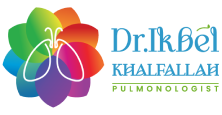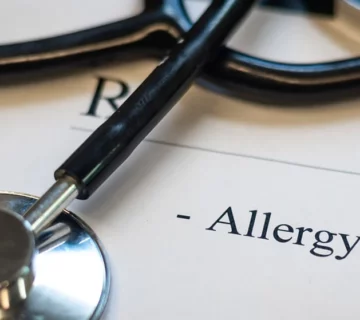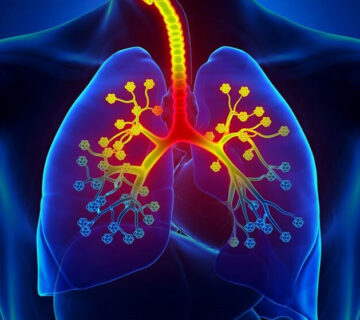It is very important for adults with symptoms of allergic diseases, mainly asthma and allergic rhinitis, to be diagnosed and treated by experts in allergic diseases. Adult allergists (immunology and allergy disease specialists) are internal medicine or pulmonology specialists who have received advanced training on asthma and allergic diseases in adults and are entitled to receive an adult allergist diploma. Even people with allergies are either unaware or have little knowledge that there are adult allergists available to treat their condition. In this article, we told you who the adult allergists are.
Allergy and Immunology specialization is a branch of medicine that covers many different subjects. It is particularly interested in the state and physiological functions of the human body’s immune system in healthy or diseased states, and immunological disorders that occur as a result of improper functioning of people’s immune systems (e.g. immune deficiencies, autoimmune disorders, allergic diseases). Adult Allergy Diseases is the branch of medicine that deals with problems and diseases that develop in adults related to allergens and the development of allergies to them. Allergic problems seen in adulthood, if not treated early, can cause serious negative reactions in later years, sometimes leading to death. Allergic problems occurring in adults must be monitored and treated by an Adult Allergist. Adult allergists work in adult allergy departments at university hospitals, training-research hospitals, and private centers.
What Diseases Do Adult Allergists Deal With?
Adult allergists examine diseases that affect the respiratory tract, such as allergic rhinitis (hay fever) and allergic asthma; Conditions such as food allergy, drug allergy, bee allergy, latex allergy, anaphylaxis that can affect the whole body; It deals with different diseases that affect the skin, such as contact allergy, urticaria, eczema (atopic dermatitis), hereditary angioedema.
Adult allergic diseases should be dealt with especially by an adult allergic disease specialist.
These allergic diseases that develop after the age of 18 are of interest to adult allergy specialists. Because these specialists receive the most detailed training in diagnosis and treatment of allergic diseases seen in adults. They help adult patients with the diagnosis and treatment of allergic diseases by combining their training in internal medicine/chest diseases and allergic diseases.
How to Become an Adult Allergist?
In order to become an adult allergist , you must first complete medical school. Graduates who complete a six-year medical education can become doctors. Then, you must pass the specialty exam to gain the internal medicine or chest diseases departments. Those who successfully complete the 4-5 year specialty training receive the title of specialist doctor.
For adult allergy specialization, it is necessary to receive training at a university or training hospital with an adult allergy department. There are some conditions to receive this training. First of all, you need to be an internal medicine or pulmonology specialist. After gaining knowledge and experience about many diseases in their field of specialization, it is necessary to take the subspecialty examination, which is only available to specialist doctors and is held annually by the higher education institution. If you are successful in this exam and get enough points, you will be eligible to receive adult allergy specialist training.
After the internal medicine or chest diseases specialist training, 3 years of training is given in the allergy department on the development mechanism, diagnosis and treatment of allergic diseases in adults . In this training, competence is provided in allergy test techniques, respiratory function tests and various tests. Adult allergy patients are learned to be treated and followed. Immunodeficiency diseases are followed. The latest developments in treatment and diagnosis are followed. Research is done. At the end of this period, a final exam is taken. 2 years of state service is made. Afterwards, the adult allergy specialist can work independently.
As a result, it is important to know that adult allergists are not only internal medicine or pulmonology doctors, but also experts who have advanced training in allergic diseases seen in adults. Since many systems and organs are involved in most diseases, patients should be evaluated as a whole and other diseases should be treated and diagnosed in addition to their allergic diseases. Adult allergists are the doctors most experienced in allergic diseases in adults.
What kind of training is Adult Allergy Specialist Training?
Adult allergy residency training consists of detailed training in asthma and allergic diseases in clinical immunology and allergy science. In the first year, theoretical training is received on how allergic diseases develop. In the following 1 year, theoretical and practical training is received on the tests to be used in the diagnosis of allergic diseases. In the last year, he has become responsible for the diagnosis and treatment of allergic diseases. Responsible for the laboratory where allergic diseases are diagnosed. At the end of 3 years, after submitting the final thesis, the final exam is taken. If successful, you will be eligible to receive an adult allergy specialist diploma. In total, a minimum of 13 years of medical education is required to become an Adult Allergist.
Internal medicine or chest diseases specialists are not allergy specialists. Adult allergy specialists are authorized specialists in the diagnosis and treatment of allergic diseases such as asthma, allergic rhinitis, and eczema. They are authorized specialists to administer allergy vaccines. They are authorized to prescribe medications used in the treatment of allergies, such as anti-IgE, which are included in the state’s special payment coverage.
Internal medicine, chest diseases and ENT specialists are authorized specialists in diseases such as rhinitis, bronchiectasis, pneumonia, chronic lung diseases, interstitial lung diseases, which are directly related to their specializations. However, they do not have special training in approaching the patient in terms of allergy, allergy tests and allergy vaccines.
It is very important to receive advanced training in this area in order to approach allergic diseases in adults. Internal medicine and chest diseases doctors cannot be expected to have as much experience as adult allergy specialists in the details of allergic diseases.
For Which Disease Symptoms Should I See an Adult Allergist?
You may encounter it in adulthood in the later years of your life; When you see symptoms of diseases such as asthma, allergic rhinitis, food allergies, hives, acute urticaria, chronic urticaria, eczema, drug allergies, bee and insect allergies, metal allergies, pet allergies, hereditary angioedema, or when your doctor suspects these diseases, the most experienced experts on this subject are You should go to an adult allergist who has
Why is it important for me to see an adult allergist?
When you suspect one of the allergic diseases, it is very important to be evaluated, diagnosed and treated by an adult allergist. Because allergic diseases are diseases that do not get better with 1-2 weeks of treatment, but sometimes can take years to get better. There is a risk that they may receive unnecessary treatment for a long time due to misdiagnosis or that they may face progression of the disease due to missing the disease. For these reasons, it is very important for a definitive diagnosis to be diagnosed and treated by adult allergists, who are the most experienced experts in this field.
Since asthma and many other allergic diseases are not short-term and temporary diseases, patients must be seen by an adult allergist to ensure that the correct diagnosis is made at the beginning and the most appropriate treatment is given with the least amount of medication.
Thanks to adult allergy specialists, it may not be necessary to visit many specialists. Allergic diseases usually tend to occur together. An adult patient with asthma also experiences symptoms such as allergic rhinitis or hay fever, eczema. Therefore, there is no need to see a chest diseases specialist for asthma, an ear, nose and throat specialist for allergic rhinitis, or a dermatologist for eczema. As is known in adults, allergic rhinitis or hay fever, which starts with a runny nose, itching, congestion and sneezing, later turns into asthma with complaints such as cough and shortness of breath, and skin diseases such as eczema, atopic dermatitis and urticaria are also seen together. The most experienced specialists in urticaria, eczema and asthma are adult allergy specialists.
After the adult allergist diagnoses the allergic disease, it is appropriate for the patient to be followed by adult allergists and to be seen again at appropriate intervals.
Adult allergists must perform allergy testing and vaccination treatments for adults over the age of 18. You ask why?
Training on allergy testing and treatment in adults is not provided to all specialist doctors. Allergy testing alone is meaningless. In order to perform allergy testing on adults, theoretical training in allergy and immunology must first be obtained. Then, training is received on subjects such as application of allergy tests, cross-reactions, their place in diagnosis and allergic shock. Therefore, it should be done by or under the supervision of adult allergists. Vaccine therapy used in treatment is a treatment approach that is only under the authority of adult allergists. Vaccines should be prepared as personalized mixtures according to allergy test results and symptoms in the adult. This requires training and experience. Long-term vaccine treatment (lasting at least 3 or 5 years) by physicians who do not have adult allergy specialist training is likely to fail after 3 years. Both time and financial losses are wasted in vain. As adults develop allergic diseases in later years, their treatment becomes more difficult. Wrong drug and vaccine treatments may not provide adequate response and may lead to increased allergic complaints. The most experienced experts on asthma and allergic diseases in adults are adult allergists.
The Importance of Internal Medicine and Allergist
Another importance of being treated by an internal medicine and allergic diseases specialist is that the diseases can coexist or affect many organs. For example, a patient with anemia may mistakenly go to many doctors for itching; However, patients should be evaluated systemically and holistically. Therefore, even if no allergy is detected in patients evaluated by an internal medicine and allergic diseases specialist, it is possible to evaluate them for other diseases and avoid repeating unnecessary allergy tests.
If allergic diseases are not diagnosed correctly, we may face unnecessary and long-term use of asthma or allergy medications. It is extremely wrong for allergy vaccinations to be started by physicians other than adult allergists. It may cause significant undesirable problems in patients.
How Do I Know If a Doctor is an Adult Allergist?
A reliable proof of having a specialist certificate is the title of “Allergy Specialist” on the doctor’s stamp . Because in order to be considered as an allergist, expressions such as asthma and allergy department, allergy department, allergy department, allergy association founder, president are often used. In addition, it is suggested that allergy congress participation documents or certificates should be present to support this perception. However, what is essential is the official specialist training and diploma.
Can Every Hospital Have an Allergy Department?
Standards have been developed in Europe to create an adult allergy disease department. According to these standards, having an adult allergy specialist is a must . In addition to an adult allergy specialist, important conditions such as allergy tests, patch tests, respiratory function tests, and providing an environment where allergic shock treatment can be performed must also be met. Competent allergy departments are generally available in university hospitals and training and research hospitals in Turkey. Most of the allergy departments outside these institutions are far from these conditions and most of them do not even have an allergist.
Istanbul Allergy is a center established in Turkey to diagnose allergy diseases and provide solutions, where all kinds of tests can be performed, and to become an allergy department at European standards.
Istanbul Allergy was founded by Prof. in March 2016. Dr. It was founded by Ahmet Akçay, and in a short time, the pediatric allergy department of Istanbul Allergy, which complies with European standards, came into operation. As the Adult Allergic Diseases Department, efforts have been made to diagnose and provide solutions to all kinds of allergy diseases and asthma at Istanbul Allergy Center since 2017.
Important Points About Adult Allergist
- They are doctors who have received training and a diploma in the diagnosis and treatment of asthma and allergic diseases seen in adults, and who are also internal medicine/pulmonary diseases specialists.
- Correct diagnosis of asthma and allergy diseases in adults is very important. While incorrect diagnosis may lead to unnecessary use of medication for a long time, missing a diagnosis may also cause the disease to progress.
- If adults have symptoms of asthma and allergies, it is beneficial for them to see an adult allergist before starting long-term treatment.
- After you decide to see an adult allergist, make sure that the physician you see is an allergist.




